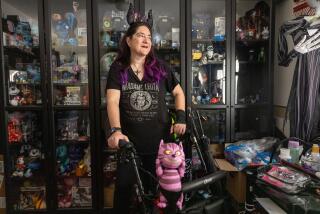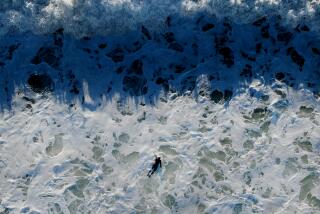A weekend of learning for diving instructors and the disabled
Cassandra Tang never learned to swim as a child and steered clear of the water. Then, when she was 22 years old, a gunshot wound paralyzed her from the chest down. Her fear of drowning intensified and she figured any chance of wading in an ocean or pool had vanished.
On Sunday, Tan, now 40, was breathing nine feet underwater, coming up only to adjust her goggles and repeat the same phrase: “It’s so amazing!”
Tang was among a handful of participants at Deep Blue Scuba & Swim Center in Long Beach assisted by divers becoming certified by the Handicapped Scuba Assn., a nonprofit based in San Clemente. After three long days of instruction, divers were able to get hands-on experience with a disabled person in the water.
Each disabled person was surrounded by three divers, whose jobs included watching out for feet scraping on the pool bottom, managing the air tank and making sure the participant was comfortable.
“You have to take a lot into consideration, like how you hold them,” said Jose Luna, 52. “Some might not be able to keep the regulator in their mouth. And eye contact is so important, it tells you if they’re OK or not. But the one thing I’ve really learned is that these folks don’t whine and they have a lot of heart.”
Luna, who has been diving for four years, recently retired from his job with the Eastern Municipal Water District and found himself with extra time on his hands. His diving instructor encouraged him to become certified as a “dive buddy.”
Also in the class was Jason Aurand, who charters dive boats for a living and wanted to become more comfortable working with his hearing-impaired customers.
“It was a little nerve-wracking,” Aurand, 33, said of the day’s work. “I didn’t want to do anything wrong to hurt them.”
Aurand spent the day assisting 17-year-old Gracie Williams, who was born with cerebral palsy and walks with crutches. Gracie took to the scuba equipment like a pro, immediately wanting to spend long minutes underwater. Her mother, Mira, watched from the sidelines, snapping pictures and beaming.
“This is the first time she’s doing this!” she said.
The association holds trainings across the nation, hosted by various organizations, that include multiple hours in a pool doing empathy training. Students take turns being blindfolded or having their limbs bound to better understand how it might feel to be disabled. Instructor Denise Dowd said the most important thing she hopes to convey to students is that every disabled person is different. “We can’t come in with a preconceived notion,” she said.
This weekend’s three-day course was hosted by the Disabled Veterans Scuba Project, an organization that works with Veterans Affairs’ hospitals. Founder Melvin Pasley said diving can be a positive experience for those with physical and mental ailments such as post-traumatic stress disorder.
“You’ve lived a life where every morning you hear an explosion, you take your chances driving on the road, you go to sleep counting the bullet holes in the ceiling. After living on that adrenaline for so long you come back and you don’t feel normal,” Pasley said. “Scuba diving gives back a little of that adrenaline because it is an adventure sport with the peace of a fish tank. It’s just a place to forget about everything else.”
For Tang, the introduction to diving was transformative and she called Sunday the best day of her life. “I’ve always been so careful, like not falling in my wheelchair. Now, suddenly I’m doing this. I feel so free.”
More to Read
Sign up for Essential California
The most important California stories and recommendations in your inbox every morning.
You may occasionally receive promotional content from the Los Angeles Times.











